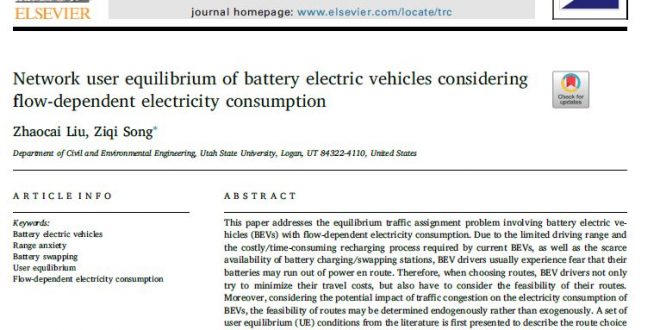شبکه تعادل کاربران باتری خودروهای برقی با توجه به مصرف برق وابسته به جریان
This paper addresses the equilibrium traffic assignment problem involving battery electric vehicles (BEVs) with flow-dependent electricity consumption. Due to the limited driving range and the costly/time-consuming recharging process required by current BEVs, as well as the scarce availability of battery charging/swapping stations, BEV drivers usually experience fear that their batteries may run out of power en route. Therefore, when choosing routes, BEV drivers not only try to minimize their travel costs, but also have to consider the feasibility of their routes. Moreover, considering the potential impact of traffic congestion on the electricity consumption of BEVs, the feasibility of routes may be determined endogenously rather than exogenously.
A set of user equilibrium (UE) conditions from the literature is first presented to describe the route choice behaviors of BEV drivers considering flow-dependent electricity consumption. The UE conditions are then formulated as a nonlinear complementarity model. The model is further formulated as a variational inequality (VI) model and is solved using an iterative solution procedure. Numerical examples are provided to demonstrate the proposed models and solution algorithms. Discussions of how to evaluate and improve the system performance with non-unique link flow distribution are offered. A robust congestion pricing model is formulated to obtain a pricing scheme that minimizes the system travel cost under the worst-case tolled flow distribution. Finally, a further extension of the mathematical formulation for the UE conditions is provided.
نویسندگان: Zhaocai Liu, Ziqi Song
ژورنال: Transportation Research Part C: Emerging Technologies
سال انتشار: 2018
دانلود مقاله:





